A reflection by Amelia Meman on her feminist mentoring relationship with Assistant Director Megan Tagle Adams.

With Megan’s departure from UMBC (today!), I feel the Women’s Center is saying goodbye to a real social justice champion on our campus. Someone who was constantly striving for excellence in our institution. More than this, though, I feel I am saying goodbye to someone who has taught me what feminist mentorship—in its best iteration—can be.
Traditional models of mentorship are often paternalistic and hierarchical. Relationships are based on a transactional relationship between a mentor–older, more experienced in a particular professional setting, more “successful”—and their mentee—a younger novice looking for their niche, to expand their professional network, and to build on their skills.
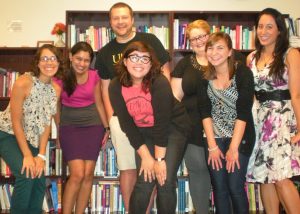
One of my favorite metaphors for this sort of relationship is Paolo Freire’s metaphor of students as containers to be filled—also called the “banking model” of education. In such a model, teachers deposit knowledge and students are meant to memorize and regurgitate. Such a pedagogical method is less about truly learning, and more about recitation. Freire argues, rather, that student and teacher should be able to learn from one another in a dynamic process. The central idea of Pedagogy of the Oppressed is that pedagogy must be forged with, and not for the oppressed. I know, I know—mentorship =/= teaching; however, I think that Freire’s ideas can be applied to any social justice-oriented relationship—and that is what my mentorship with Megan is in many ways.
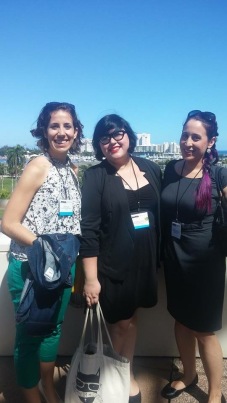
Additionally, feminist and multicultural academicians have contested what mentorship can look like, especially in reaction to the restrictive and frankly stale traditional mentorship model described above. Feminists have developed new models that ask mentor and mentee to account for power dynamics, to treat both as learners and knowledge makers, and to continue reworking the tension around artificial boundaries between professional, political, and personal worlds. Ultimately, mentoring should be based on the feminist and social justice politics we champion.
I would like to take the following post to illustrate what a successful feminist mentorship can look like—using my mentoring relationship with Megan as a model:
Embrace a relationship of mutual empowerment
When I came onto the Women’s Center scene as an Honors College intern in 2013, I was new and so was our Coordinator (now Assistant Director), Megan Tagle Adams. It was exciting to be partnered with this spunky new purple-haired woman who was obviously super cool because she had so much experience in gender studies and feminist activism and all kinds of things.
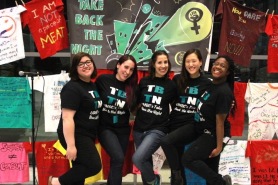
It was in our first meetings together (before Megan had an actual office and when she was just behind a big glass partition in the front office) that we worked together on what would come to be Critical Social Justice.
I remember it so so clearly:
My idea was very vague and very ambitious. Initially, I wanted to do some sort of big, one-time event called an, “Inclusivity Fair,” where we would have UMBC community members and people from Baltimore City come and create engaging, social justice-oriented activities. The concept was fluid and gigantic, and my passion for it was white bright fire hot, which is really never a great combination for a truly successful event. Knowing all of this, Megan worked with me to whittle this giant pile of potential into what is now: an annual event on UMBC’s campus.
Together, Megan and I worked to create Critical Social Justice into an event, an initiative, and a way of working. Megan empowered me—and I her—and together (with the help of numerous others) we created CSJ. She helped me funnel my ideas and my energy into something comprehensive, sustainable, and organized—her strengths exactly. I helped Megan make an impact on our campus in her first year here, and we became quick and powerful collaborators. We empower one another to create great things.
Move away from transactional learning wherein knowledge is deposited—share the learning experience
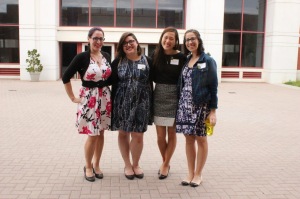
Although I have, in fact, learned a lot from Megan, I have to acknowledge that we have both been learning from each other. For example, Megan was my research mentor for URCAD. My research was an analysis of This Bridge Called My Back using a postpositivist realist theory of identity as a lens. I know. That’s a mouthful and a half.
Luckily, Megan had a lot of knowledge on feminist theories and especially This Bridge. Not as luckily, she was not steeped in postpositivist realist theory like I was. As my mentor, though, Megan allowed me to teach her about this. Rather than trying to learn all about this theoretical perspective and then take a top-down approach to my research, we came together, collaborated, and learned from one another. I taught her about the theory I was using, and she expanded my understanding of This Bridge. Together, we were able to share our experiences and perspectives, and create a research project that was comprehensive, dynamic, and unique. This was only enabled by our ability to teach and learn from one another.
Promote a holistic model of professional/academic life
As many might know, one of the first things Megan did when she got into the Women’s Center was created the Women of Color Coalition and began really centering conversations about racial justice and intersections with feminism.
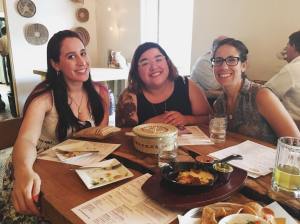
In 2013, when both of us started, I had a lot of trouble understanding my racial identity. Megan and I would often come together and talk about what it meant to be biracial, white and Filipina. We understood the strange privilege and not-privilege that we occupied, how it was different from region to region, and how it translated into our cultural identities. Megan really helped me construct a sense of belonging with other women of color and racial justice activism networks.
The personal is political in feminism—and just so, feminist mentorship should rightly blur the lines to promote holistic success. Megan and I both had boundaries around certain topics (as any relationship should), but we also worked together to make professional, academic, and personal discoveries about ourselves and the world we live in.
Share power, share respect, embrace mutuality
As I believe all of these facets of our relationship have demonstrated, Megan and I shared power, shared respect, and embraced mutuality. We were collaborators, co-leaders, teachers, students, friends. As such, I believe our mentoring relationship was something so much more meaningful and enriching than what a “typical” mentorship looks like. It was never about Megan having more power and teaching me how to gain that power. Rather, it was always about sharing power, learning together, and making the world better with each other.
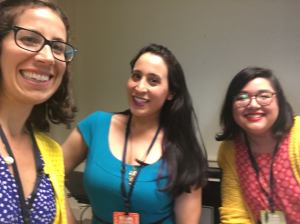
As folks pursue their careers and their goals, I hope you are able to find mentors that disrupt traditional models of mentorship. As I hope I have demonstrated, mentorship does not have to be limited to learning new skills and benefitting from someone’s established network. Feminist mentorship expands the potentials of this relationship and centralizes the idea of learning from one another to create a world where social justice is essential.
With my mentoring relationship with Megan, I believe we have both grown tremendously and have contributed much to UMBC’s social justice vision. I’m really going to miss my mentor as she starts on a new path as the Director of the Women’s Resource Center at California State University, Dominguez Hills. However, like any other great leader, mentor, and friend, Megan’s impact will continue to resonate throughout UMBC long after she is gone.
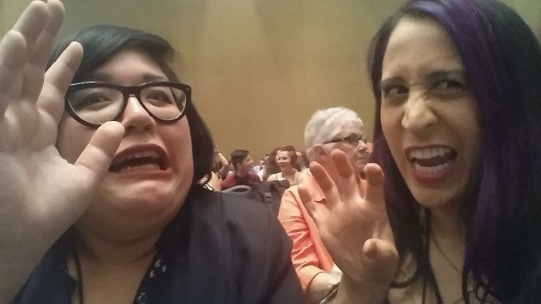
This is a lovely homage to your mentor, as well as a thoughtful lesson on feminist and activist models of mentorship. Gives us all a lot to think about.